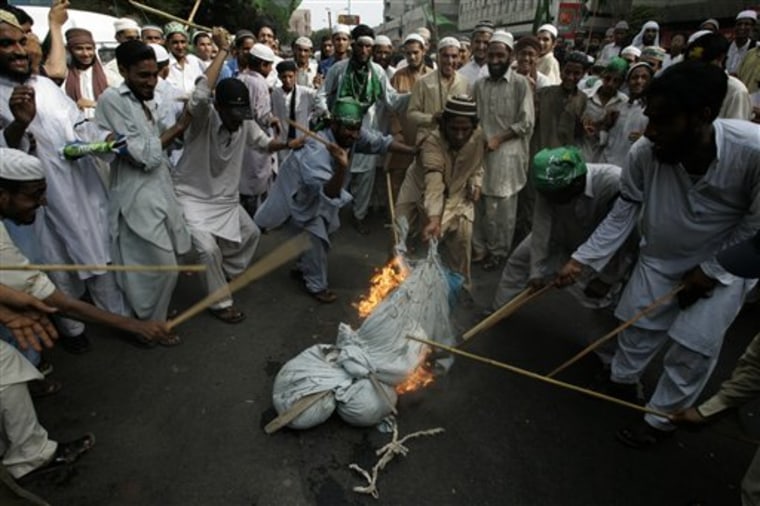Pakistan's military chief denounced terrorists as enemies of the country and Islam, but warned his officers Monday to avoid killing civilians as they widen their operations against the Taliban.
The government is seeking to capitalize on general public support for its six-week-old offensive in the Swat Valley region and open a new front in a nearby lawless tribal zone where al-Qaida and the Taliban are entrenched.
The military action is being welcomed by the United States as a strong stand against militants after years of failed offensives and striking deals rather than confronting Taliban hard-liners head-on.
But the politically weak government is also keenly aware that public support could sour if civilian casualties become heavy or if the task of resettling more than 2 million refugees displaced by fighting in the northwest is badly handled.
A top official in the northwest said Sunday that the government had given the order to send the military after Pakistani Taliban leader Baitullah Mehsud. The announcement was interpreted as effectively giving the go-ahead for a fresh military offensive in Waziristan, the semiautonomous tribal region on the border with Afghanistan that is rumored to be a hiding place of Osama bin Laden and where Mehsud makes his base.
Military closes key roads
The military reportedly closed key roads leading into the area on Monday, but there was no immediate sign of fighting.
In a carefully stage-managed event Monday, selected television outlets taped armed forces chief Gen. Ashfaq Parvez Kayani dressed in a tight-fitting flight suit clambering into the copilot's seat of an F-16 fighter-bomber before taking off for a flight over the Swat Valley.
In an address to officers before the trip, the army general denounced Mehsud and the Taliban leader in Swat, Maulana Fazlullah, saying they had nothing to do with Islam.
"Terrorists are the enemies of Pakistan and enemies of Islam. We have to eliminate them," Kayani was quoted as saying by Geo TV, one of three networks invited to cover the event. Journalists were not allowed to ask questions.
But he also stressed the importance of avoiding civilian casualties.
"In the present circumstances ... it is difficult to differentiate between friend and enemy," Kayani told the officers in comments broadcast by Geo. "The problem is that you have to separate black from white ... to avoid collateral damage."
Focusing on Waziristan
Focus has increasingly shifted from Swat to Waziristan in recent days, though the military says it is still fighting pockets of resistance in the northwestern valley. In one skirmish Monday, the military said troops battled militants fleeing on mules from Fazlullah's rear base of Piochar.
The military has struck suspected militant strongholds in South Waziristan and neighboring Bannu with shells and bombs in recent days but insists the operations are a response to increased militant attacks on troops and not the beginning of a major offensive.
The U.S. has frequently targeted South Waziristan with missile strikes. The latest was on Sunday and killed five suspected militants, two Pakistani intelligence officials said on condition of anonymity because they were not authorized to speak to the media.
Owais Ghani, governor of North West Frontier Province, said late Sunday that the government felt it had no choice but to use force against Mehsud and his network, calling him "the root cause of all evils."
"The government has decided that to secure the innocent citizens from terrorists, a meaningful, durable and complete action is to be taken," he told a news conference.
Attacks strengthen anti-Taliban mood
Mehsud is blamed for a spate of suicide attacks across Pakistan since late May that have killed more than 100 people, and which the Taliban says are retaliation for the Swat offensive.
Those attacks, which have included at least two mosque bombings and the slaying of a leading moderate cleric, have reinforced the anti-Taliban mood.
In the southern city of Karachi on Monday, hundreds of protesters furiously beat and kicked effigies of Mehsud and a hardline cleric who negotiated a failed peace deal that handed control of Swat to the militants prior to the military operation.
"They are the murderers of the Muslims," the mob chanted, setting the effigies alight.
Meanwhile, Interior Minister Rehman Malik said police in Islamabad had foiled "a number" of plots to kidnap diplomats and carry out bombings in the Pakistani capital in the past six months. He did not elaborate.
